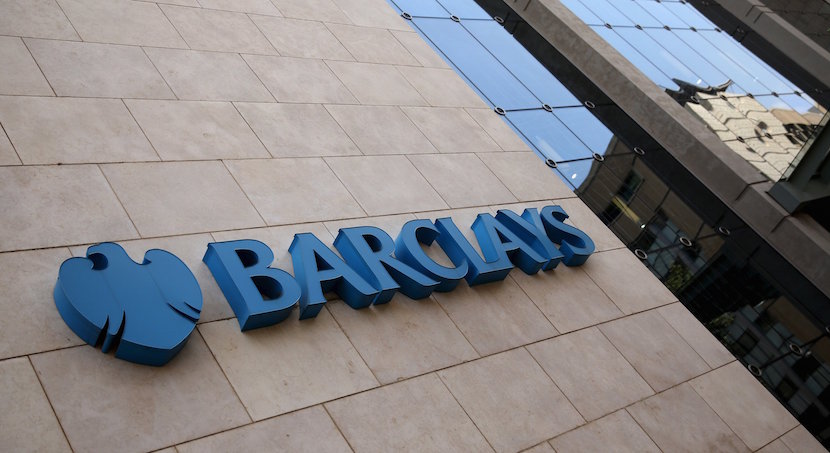You can never be certain whether it’s more spin or actually some much needed good news for Barclays Africa staff. But for the first time since December when news of its parent’s divestment surfaced in London, some sun is breaking through the clouds that have been bemusing Absa staffers. They know for certain a decade of following a London-sourced strategy has ended. But still have no idea what will replace it. The group’s deputy CEO David Hodnett – boss Maria Ramos is on the Pravin Gordhan roadshow – says there are plenty of potential buyers for the Barclays shares. Which suggests that three months after the share sale bomb started ticking, Barclays Africa executives are still weighing up options. Ambitious former Barclays CEO Bob Diamond is apparently not among them. Not yet anyway. Absa staff should hope the beauty parade is won by a stunner from the private sector, not some frumpy State-controlled bureaucrat. – Alec Hogg
By Renee Bonorchis
(Bloomberg) — Barclays Africa Group Ltd. said there’s no lack of interest from buyers seeking a stake in South Africa’s third-largest lender as Barclays Plc prepares to reduce its 62.3 percent holding to less than 20 percent.
The London-based bank’s shares won’t be “sold in the short term and a number of players will have a say in the process,” Barclays Africa Deputy Chief Executive Officer David Hodnett said in an interview in Johannesburg on Wednesday, without elaborating on who the buyers might be. It’s too soon to speculate how the British bank will sell its stock, he said, adding that regulators will be looking for investors who offer “long-term stability.”

Barclays Chief Executive Officer Jes Staley is cutting about 1,200 investment-bank jobs, restructuring management and reducing dividends after profit fell in 2015. Barclays said March 1 it plans to sell down its interest in the Johannesburg- based lender, formerly known as Absa, over the next two to three years to reduce demands on the capital it needs to set aside for controlling the company.
Bob Diamond, the former CEO of Barclays, hasn’t directly approached the African lender on buying shares in the company, Hodnett said.
While the two companies will still operate an investment- banking joint venture, the African unit’s work with multinational corporations and its cash-equities business may be impacted by the parent’s withdrawal, he said. The investment bank still has room to grow and Barclays Africa wants to expand in Nigeria, while searching for insurance assets in Ghana as part of a strategy to be among the largest lenders on the continent, Hodnett said.
We have not been approached by Bob Diamond. We have an enviable franchise across the African continent – we have no intention of selling.
— Absa Group (@Absa) March 4, 2016
Shares Drop
Barclays Africa dropped 2.1 percent to 138.01 rand, compared with a 3.1 percent decline in the seven-member FTSE/JSE Africa Banks Index.
The British bank bought the South African business in 2005 and three years ago the Johannesburg-based unit acquired its parent’s operations in eight African nations, giving Barclays a presence in 12 countries on the continent with 12 million customers. The prospects for South Africa and Africa are “pretty solid,” Ramos said in an interview with the Wall Street Journal on Wednesday.
“To sell over 42 percent of the stake in Barclays Africa, the most efficient move for Barclays Plc would be to sell to another bank or institution, which could be negative for Barclays Africa in terms of systems, strategic direction and timing to integrate operationally,” Harry Botha, a banks analyst at Avior Capital Markets, said in a note this week. Other South African lenders and any global systemically important banks similar to Barclays would be unlikely buyers, he said.
Regulatory Burden
The stake sale represents an about turn for Barclays, which has operated on the continent for more than a century. After firing former CEO Antony Jenkins last July, Barclays Chairman John McFarlane that same month traveled to South Africa to make clear his “very firm support for the Africa business,” Barclays Africa CEO Maria Ramos said at the time. Staley, who started in December, is now having to shrink the bank and boost capital ratios.
McFarlane and Staley probably “had a dilemma because Barclays Africa is a great asset, but then there’s the overlay of the regulatory burden,” Hodnett said. The parent company exiting its entire stake would be an “extreme scenario,” he said, adding that the sale of shares might be an opportunity for black investors to buy into the bank.
With the financial backing of the U.K. lender no longer implied, both Fitch Ratings and Standard & Poor’s have downgraded Barclays Africa’s national credit status, bringing it into line with its South African peers. The downgrades will have no impact because the bank doesn’t raise money outside of its home market and local investors had already discounted the involvement of Barclays, according to Hodnett.
In its annual report this month, the U.K. lender identified potential money laundering linked to currency transactions at the business in South Africa. Customers may have been involved in fraudulent foreign-exchange transfers from South Africa to accounts in Asia, the U.K., Europe and the U.S, it said. The resulting probe is a setback for Staley who has to improve the British bank’s reputation after its involvement in foreign- exchange manipulation and Libor rigging.
The company is conducting “a very initial investigation,” Hodnett said. “We’re working our way through various accounts. It’s too early to talk about it.”

